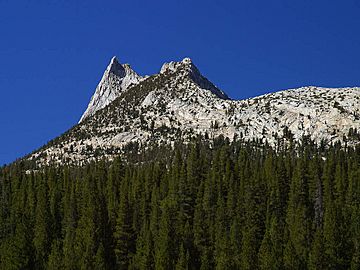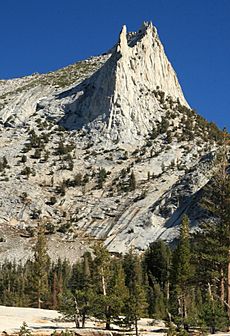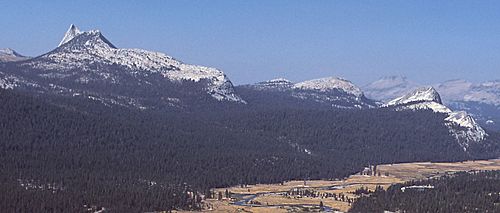Cathedral Peak (California) facts for kids
Quick facts for kids Cathedral Peak |
|
|---|---|

Cathedral Peak
|
|
| Highest point | |
| Elevation | 10,916 ft (3,327 m) NAVD 88 |
| Prominence | 919 ft (280 m) |
| Listing | SPS Mountaineers peak |
| Geography | |
| Location | Yosemite National Park, California, U.S. |
| Parent range | Cathedral Range, Sierra Nevada |
| Topo map | USGS Tenaya Lake |
| Geology | |
| Age of rock | Cretaceous |
| Mountain type | Granite arête |
| Climbing | |
| First ascent | 1869 by John Muir |
| Easiest route | Rock climb class 4 |

Cathedral Peak is a famous mountain located in Yosemite National Park in California. It is part of the Cathedral Range, a group of mountains that branch off the larger Sierra Nevada mountain range. The peak gets its name because its shape looks like a grand cathedral. This unique look was created by powerful glaciers long ago.
Contents
Exploring Cathedral Peak
Cathedral Peak has a smaller peak nearby called Eichorn Pinnacle. This pinnacle is named after Jules Eichorn. He was the first person to climb it using a difficult route in 1931. He climbed it with Glen Dawson.
John Muir's Adventures
A famous naturalist named John Muir explored Cathedral Peak in 1869. He wrote about his experiences in his book, My First Summer in the Sierra. Muir described the peak as having a nearly square body. He noted its wonderfully regular and balanced roof slopes.
He also mentioned a large snow-bank at the base of the peak. Muir estimated the peak's height to be about 11,000 feet above sea level. He noted that the peak itself rises about 1,500 feet from the ridge it stands on. Muir also described a beautiful lake nearby. The rocks around the lake were so shiny from glaciers that it was hard to tell where the rock ended and the water began.
How Cathedral Peak Was Formed
Cathedral Peak is made of a type of rock called Cathedral Peak Granodiorite. This rock pushed its way into older rocks in the Sierra Nevada Batholith. It is part of a group of rock formations called the Tuolumne Intrusive Suite.
Cathedral Peak is the youngest rock in this group. It formed about 83 million years ago during the Cretaceous Period. The rock is mostly granodiorite with large crystals of microcline.
Glaciers and the Peak's Shape
During the last ice age, Cathedral Peak was a "nunatak". This means the peak stood tall above the glaciers. The glaciers carved and sharpened the base of the peak. They also plucked away at its sides. This action helped create the peak's distinctive cathedral-like shape.
 | Janet Taylor Pickett |
 | Synthia Saint James |
 | Howardena Pindell |
 | Faith Ringgold |


